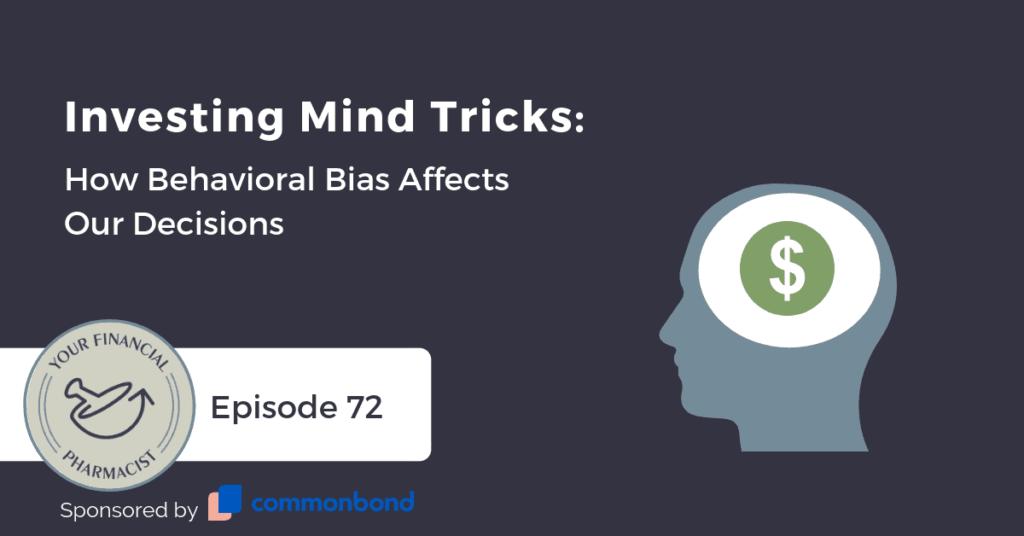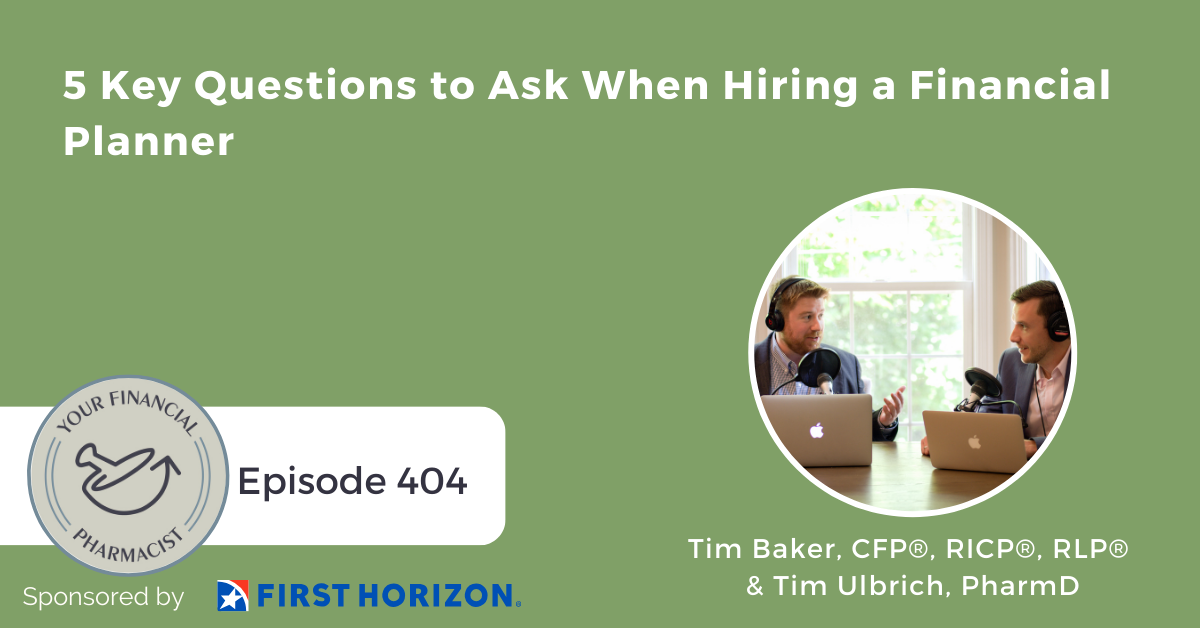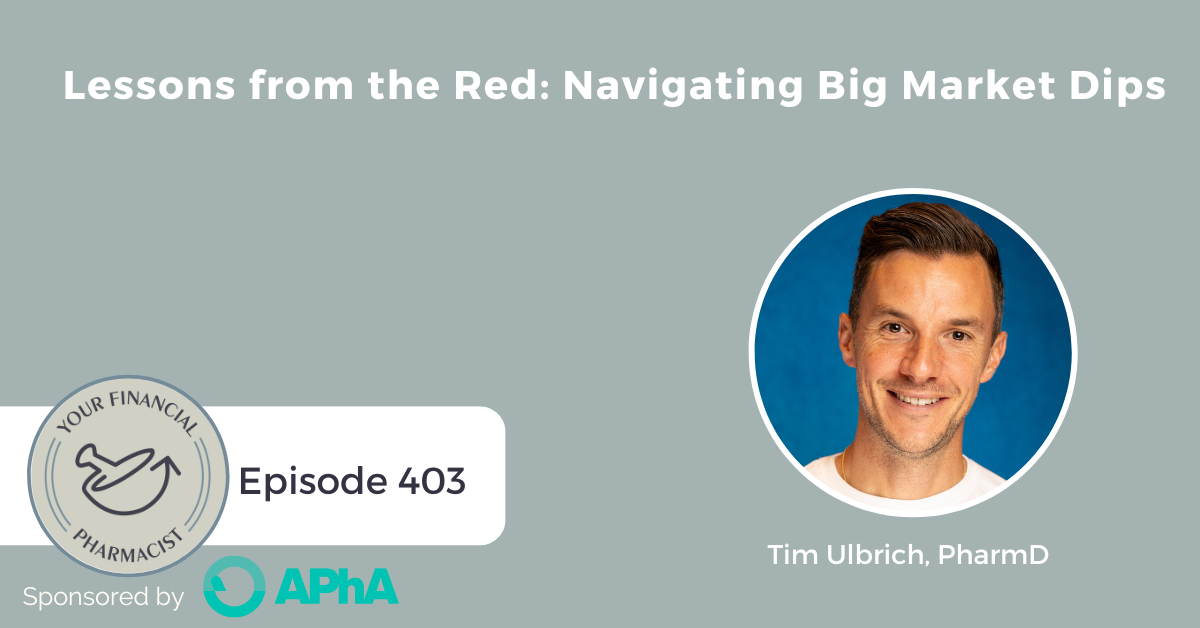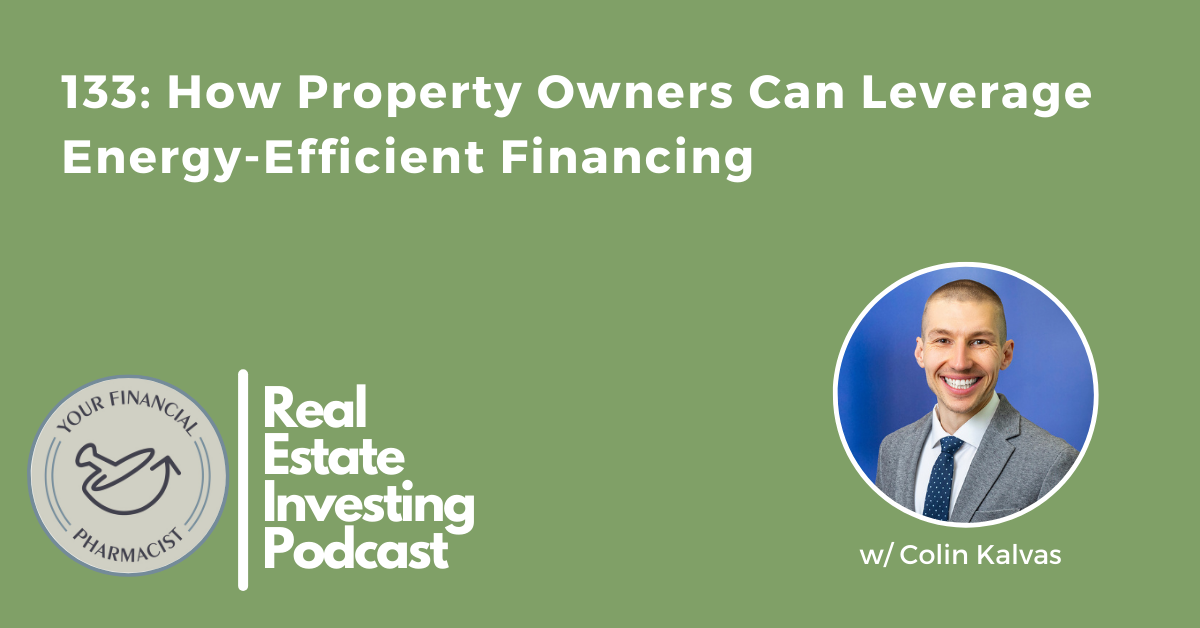How Behavioral Bias Affects Our Decisions
On Episode 72 of the Your Financial Pharmacist Podcast, Tim Church, YFP Team Member, and Tim Baker, YFP Team Member and Founder of Script Financial, discuss how behavioral bias can impact investing decisions and why they are so important to have on your radar.
Summary
Tim and Tim talk through 6 major behavioral and financial biases that have an impact on making investment decisions.
- Overconfidence bias refers to our subjective belief in our skills. Our ability to invest is typically greater than the actual objective reasoning behind it leading us to think that we have control in the stock market. An example of this can be seen in the 2006 study by James Montier, Behaving Badly, in which 74% of fund managers believed they delivered an above average job performance and the remaining 26% believed they delivered an average job performance. This shows an irrational high level of confidence. It’s also important to note that timing the market is impossible as you don’t know where the market is going to go.
- Confirmation or Hindsight bias shows that people pay more attention to information that supports preconceived ideas about a subject and they ignore or rationalize a way to the rest. The hindsight bias shows that passed events were predictable and completely obvious.
- Loss aversion is where people value the gains and losses differently. Losses have more of an emotional impact on us and we act irrationally to avoid loss and it’s one of the biggest reasons people don’t invest.
- Herd mentality means an individual conforms to the behavior of a larger group and is typically based on emotion. An example of this can be seen with Bitcoin or the .com crisis. It also happens inside mutual funds due to the actions of share owners.
- Hyperbolic discounting, or present bias, shows that we have a tendency to prefer rewards today that may be smaller or similar and give up on something greater in the future. This bias is the main reason why people don’t contribute enough to their retirement funds and discount the future reward.
- Overreaction bias is when new information is reflected instantly and investors overreact and create larger than appropriate affect on the stock market.
Mentioned on the Show
- CommonBond
- Study: Behaving Badly by James Montier
- Study: Does the Stock Market Overreact? by Werner De Bondt and Richard Thaler
Episode Transcript
Tim Church: What’s up, everybody? And welcome to Episode 072. I’m here with Tim Baker and excited to dive into today’s topic. Tim, this is something you and I have talked about many times and really appreciate the impact it has on our financial decisions. Behavioral bias related to investing has been studied a lot under the umbrella of behavioral finance. And Tim, why is this something that people really should know about?
Tim Baker: Yeah, Tim, I think it really can be summed up in three words. People are irrational. So we often think that a lot of our economic theory is based on the premise that we act as participants, as humans, as rational beings when it comes to the money and really economic theory. But oftentimes, the opposite is true. And really, some of the biases we’re going to talk about today illustrate that point, and hopefully we can get some examples out there to kind of paint the picture. But yeah, I think this is one of the things, one of the topics that really fascinates me because obviously I can see myself in a lot of these things, and I can see my clients in a lot of these biases. And you kind of shake your head, well, why do we do that? Why do we behave this way when the probabilities really aren’t different? Or whatever the case is. And I think it’s really — we have to shine a light on it to make ourselves better when it comes to not just investing, but just behavioral finance in general.
Tim Church: Yeah, I think what’s interesting is that you and I have talked about that even though we’re aware of these biases going on and how they influence our decisions, that still, we’re able to make the same mistakes based on how they play out. And so that’s what’s really tough is that even though you know about them, they still can happen. But I do think it plays so much into our day-to-day decision-making and really can have a huge impact not only today but just on your long-term outlook of your financial plan, your financial health in general. So we’re going to go through a couple of these biases and kind of talk about what they are and really kind of to focus on how they impact investment decisions. Now, they can impact other parts of the financial plan, but really, we want to focus on in terms of investments, how that happens. So let’s start out with the first one, overconfidence. So as pharmacists, we’re pretty confident because of the training and things that we have and how we make our clinical decisions. And most pharmacists that I’ve met in my career, they’re very confident in how they practice and what they do. And a lot of times that we see this actually tip into investment and personal finance — and it kind of goes back that just because you’re confident and you’re knowledgeable in one area doesn’t always mean that that’s going to be the case for finances. But Tim, talk a little bit about how overconfidence impacts investment decisions.
Tim Baker: Yeah, so overconfidence I think fits under the miscalibration bias. So you know, basically, the overconfidence bias states that subjective belief in our skills and our ability to, say, invest is typically greater than the actual objective reason behind that. So sometimes, we view that we have this illusion of control when it comes to investment. And I see this sometimes with clients today where with the markets really doing well — and I actually had a client recently reach out to me, saying, ‘Hey, I’ve been licking my wounds from the recent downturn in the market.’ And I think he’s probably suffering from a little overconfidence that you can have this illusion of control that you can control, really, the uncontrollable. And the uncontrollable really is the stock market. There are so many things that go into where the price of the market or of individual security goes that you as the investor play little role in that. But it’s interesting to kind of outline this study that was done in 2006. It’s called — a landmark study called “Behaving Badly.” And the researcher, James Montier — I believe is how he pronounces his name — basically surveyed a bunch of professional fund managers. These are the individuals that sit on top of the mutual funds and basically buy and sell investments out of that fund. And when he surveyed 300 of these professionals, he found that 74% of them believe that they had delivered above average job performance. And really, the remain 26% believed that they were at least average. So essentially, that means that 100% of those 300 surveyed believes that they are either average or above average when it comes to basically managing their mutual fund. And of course, we all know that in statistics, that can’t be the case. We have a bell curve that basically has distribution of where everyone falls. But the discrepancies really stress that many of these fund managers displayed an irrationally high level of confidence. And I would, when I saw this, when I was at West Point and even some employers since that, we had a grade essentially on a forced distribution that you’re always going to have people that are exceptional, average and then below average. So it’s the same that holds true is that for many investors, especially in this type of market, Tim, that we say, hey, I’m really killing it here. I’m doing a great job with my portfolio, I have this idea of the hot-hand falacy where I can’t lose. And you know, over time, it can be very humbling if you are in this space of being overconfident with your investments. And really, it’s an illusion of that you can actually control where the market goes because, really, you can’t.
Tim Church: So a lot of this with this bias, Tim, would — basically timing the market would fall under this bias. Is that correct?
Tim Baker: Yeah, absolutely. So there will be some people that — and I’ll give you an example, Tim. Like I had a lot of people after the last election say, hey, where do you think the market’s going to go? And I’m like, to me, my gut was that the market was going to go down for whatever reason. And I would have been wrong. So if I was trying to time it then, I would have been severely off. So again, I think what I know, I think the truism that I know about investment is that I don’t know where the market’s going to go. And I think any advisor, really investor, that tells you otherwise is lying to himself or herself. So you know, it’s the timing — you might get it right once or twice, you might read that story in the Wall Street Journal and make that investment, and it turns out right for you, but I think over time, what studies have shown is that you can’t time the market. And I think getting it right on an occasion or two leads to that overconfidence. And it’s the same thing with the fundamental analysis. You might analyze a stock and say, hey, I think this is a great buy opportunity and you buy it, and you’re right. And I think it kind of balloons your confidence a little bit. But I think more often than not, the house wins, in a sense — that the market is going to do what the market does. And really, your ability to assess and market time are going to be a distant second.
Tim Church: So basically, to heed the advice of Matthew McConaughey in “The Wolf of Wall Street,” right?
Tim Baker: Yeah, we don’t know if you’re Warren Buffett or Jimmy Buffett, if the stock is going to go up, down, left, right or in circles. So yeah, it’s true. I think it’s one of the things that I think people sometimes come to advisors on this and say, hey, beat the market. But more often than not, that’s not what an advisor should be doing or can do. So yeah, I think maybe one of the secrets of the financial planning industry is that that really shouldn’t be the reason why you are hiring someone.
Tim Church: So the second bias that we want to talk about is confirmation bias and also hindsight bias also kind of plays into that. So talk a little bit about what that one is.
Tim Baker: Yeah, so as humans, what we do is we often introduce bias when we process information, when we process events. So you know, if we break down confirmation bias, it’s typically that people pay more attention to information that supports preconceived ideas about a subject, and they basically ignore or rationalize away the rest. So one of the confirmation biases, Tim, that we probably have as a community is that we believe that passive indexing is the proper way to build an asset allocation that is low-cost and typically that’s best for the investor. Now, if I’m reading studies or I’m reading information that confirms my thesis, my belief, then I highlight those, and those carry a lot more weight as I’m reading. And then when I’m reading maybe in the same session, I’m reading something that says, “Active investment is the way to go, and you get what you pay for in terms of the investment, so you pay a little bit higher in terms of the expense ratios.” So when I read that, my bias is to kind of like, I don’t think so, I basically rationalize that away. Or I’m ignoring it and say, thanks but no thanks. So I’m not buying that. So what confirmation bias is it kind of closes my mind in the sense that I’m discounting away the counterpoint to the information. And then sometimes, that can be dangerous. So the other bias that we look at hindsight bias, and this typically occurs when people believe after the fact that past events were predictable or completely obvious. And in fact, the event couldn’t be predicted reasonably. So many events seem obvious in hindsight. So I kind of look at this as like the Monday morning quarterback where something happens and you’re like, of course that happened. These are all the things that basically led to that event. But in the moment, really, we couldn’t have predicted that. So one thing when it comes to the investing and the stock market, it’s really the subprime mortgage prices and how all of the lending standards and kind of loose actions of the bank really led to the collapse of that part of the investment world and then obviously led to the Great Recession.
Tim Church: Yeah, and that sounds very similar to overconfidence because it kind of goes back to thinking that we were really able to predict that. Even though we didn’t say it at the time, but we really felt like yeah, we knew that. So one of my favorite behavioral biases is loss aversion. And that kind of falls under this umbrella of something called prospect theory, but it’s basically where people value gains and losses differently. And really, losses have more of an emotional impact, and so we’re less likely — we do whatever we can to avoid losses. And even though we could lose some amount or gain the same amount, we would rather gain than lose, basically.
Tim Baker: Yeah, and basically, Tim, what we’re saying here is that we act irrationally just to avoid loss. So that’s essentially — and I love the quote from — if you guys have ever seen “Rounders” out there, Matthew Damon’s character, who’s a poker player, he basically says that few players recall big pots that they have won, strange as it seems. But every player can remember with remarkable accuracy the outstanding tough beats of his career. So what this means is that we, the bad beats or the losses that we take with our investments, we feel that much more than, hey, the market has been en fuego that past seven or eight years. So the example is, would you rather receive $50? So I have $50 in my pocket, and I’m good to go. Or would you rather receive $100 and then lose $50 for some reason or the other? In both instances, the net gain is $50, so I’m still walking away in both of those situations with $50, but I’m like, ah, well I had $50 more, and now I don’t have it, and that kind of stinks. And that’s kind of what we’re talking about in a very granual way. I think the status quo bias, Tim, that you talk about sometimes is really not leaving your perch, kind of where you are, because of the fact that there is choice overload or there’s the fear of maybe the unknown or fear of if I make a move, I could lose. And this is typically where you are leaving retirement savings and that default asset allocation or default contribution — we talk about the 401k inertia that I know I need to get the match, which is at 5%. But I really don’t want to do any more than that because I’m comfortable with the status quo, and I don’t really want anything to change. So the loss aversion theory, which is kind of sometimes called prospect theory, is fundamental to us as humans. And it’s not just with just investment or money. It’s just how we will shell ourselves and protect ourselves from losses, even if it’s irrational or if the probabilities tell us otherwise.
Tim Church: Yeah, and I think that this is one of the biggest reasons why people will say, I’m not investing in the stock market. I’m not going to go in and lose all of my money because of things that have occurred previously. But mainly, it’s that I don’t want to lose money, so a lot of people will justify and say, I’m going to keep it in a savings account or something that is barely probably not even beating inflation. And so that right there can play a huge impact just in that decision itself.
Tim Baker: Yeah, exactly right. And often to the detriment of just your overall financial picture.
Tim Church: So the next one we want to talk about is herd mentality. And this is an interesting one because it basically goes with the old adage that if everybody’s going to jump off a bridge, you know, would you do it? You probably heard that as a kid, right?
Tim Baker: Yeah, exactly. Yeah, well, it’s like everyone else is doing it. And that’s the question you get back. Yeah, yeah. I don’t want to hear that, though. Yeah, really, what we’re talking about here Tim is again, for the individual to kind of conform to the behavior of a larger group. And it’s typically based on emotional — it’s largely emotional rather than on a rational basis. So this could be where you hear — and I always bring it up — you hear people always talking about, bitcoin or cannabis or whatever it is. And you do that because that’s what the greater, that’s what your friends are doing, that’s what your colleagues are doing it. And as an individual, you probably would not make that same choice. But it’s a little bit of the FOMO, Fear of Missing Out, that sometimes drives this. So we saw this in the subprime mortgage crisis where people were just buying real estate, they were mortgaging their house, putting second mortgages on their house, they were putting as much into the mortgage because their neighbor did this. Or same thing with the .com crisis where everyone, if it had a .com after it, people were following each other and saying, we’ll put $100,000 into cats.com or whatever it was. So actually people taking money out of their retirement to buy stocks in this. So typically, this is where you kind of want to hit the pause button and say, does this really make sense? Am I conforming to the social pressures? Is this where it’s strength in numbers? And sometimes the contrarian view, in a lot of ways, is a better view. And this often happens with inside mutual funds. So like when you have a mutual fund manager that is managing billions of dollars of stocks and bonds inside that mutual fund, sometimes he or she is subject to that herd mentality, not because of him or her, like of their behavioral bias, but because of the herd mentality of the shareowners that he’s basically trying to manage their money for. So if people are exiting from that mutual fund and they’re basically redeeming their shares, he has to essentially cash out of his investments or her investments to make sure he gets the cash for that mutual fund person that’s exiting. So the herd mentality can be rampant up and down the investment world. And it’s just important to know if you’re caught up in that. And then again, it’s kind of why we believe that index funds that basically diversify the market where you have exposure across the market is the best way to go because you get less caught up in this herd mentality.
Tim Church: Right. And if you’re going for that buy-and-hold strategy for the most part, then you’re just basically going to ignore a lot of this news when people, masses, are changing their positions or holdings on something like that.
Tim Baker: Right, exactly right. And again, sometimes with — oftentimes with investing, less is more. So a lot of times, inaction is much better than overaction and constantly — and this is something that Ulbrich and I talk about is sometimes he talks about he just wants to meddle more, meddle in the investments. And typically, that’s not the best way. And often, that’s because you’re reacting to some of what other people are doing or the news or something like that.
Tim Church: So one of the things that always comes up in personal finance, and really, you coudl sum a lot of this up, is how you determine how much you spend today versus how much you spend tomorrow for savings, for retirement, and in your investment. And when we talk about this bias of hyperbolic discounting, also referred to sometimes as present bias, that you have this tendency to prefer rewards today that may be smaller or similar and giving up something that could be much greater down the road. And really, this is sort of the main reason why people don’t contribute enough to their retirement or possibly even anything because they want to spend and get that pleasure today because the perception is that the pleasure and emotional satisfaction of that today is going to be greater than what they could have later on. So how do you see sort of this play out, Tim, with some of your clients but just in general with investing?
Tim Baker: Yeah. I think hyperbolic discounting is typically, when I say, hey, Tim, if you’re my client, we have to make sure that we’re taking care of the Tim Church today but also the Tim Church of 30-40 years in the future. So and I feel like if you’re not feeling that push and pull between those two ideas, then you’re probably doing it wrong. So typically, with hyperbolic discount is given two similar rewards, people prefer the one that comes sooner rather than later, right? It makes sense. Time value of money teaches us that as well. And we typically discount that future reward by factoring in the delay in getting it. So it would be that, hey, Tim, if I offered you $100 today versus $300 next year or $600 in four years, those are all things your mind automatically calculates that and says, well, I really could use the $100 today and I don’t really want to wait for that $300. So that’s kind of what’s going on. I see often that when we combine this with loss aversion that we talked about previously, this can easily lead to that 401k inertia that we talked about. So there was a study that employers who were automatically enrolled in a default retirement contribution at 3%, after two years, 61% of those employees didn’t change from that 3% contribution, despite the fact that their employer matched those contributions up to 6%. And a little of this probably plays into the status quo bias as well that we talked about. So I think that it’s hard for us to — I often talk about this with prospective clients and even clients. It’s like, I hear you, Tim. I know I have to save for my retirement. I know I have to do these things, but I’m really under the gun with this credit card debt or with this student loan debt. And these are the pains — that’s a future Tim problem. Like I’m really trying to focus on what’s in my face. So the hyperbolic discounting, this bias is really what is in play when we’re having that struggle against, OK, how do I make sure what I need to do today and really for the future?
Tim Church: Yeah. I think you just have to figure out what that percentage to what you’re going to spend today, but also make sure you’re on track. And so I think having goals and milestones that you’re trying to hit, especially for investing, your net worth, those are really good to have so you can always keep that at the forefront of your mind. But also being able to enjoy some of the money that you can spend today and have available.
Tim Baker: Yeah, and I will say, like, if we’re doing that more consistently — and I think some of this, we saw this with Tim Ulbrich and Jess Ulbrich where TIm is definitely looking into the future, and Jess is really more like, well, let’s enjoy our family, enjoy our life. I think there’s a good push and pull between that because I think if you’re always looking into the future and you don’t do the things that you want to do, then that’s not a wealthy life either. So I think those are important things to keep in mind.
Tim Church: So what else do we have, Tim? What’s next on the behavioral bias?
Tim Baker: Tim, I think the big one that I’d like to kind of go through is the overreaction and availability bias. I think these are fascinating. And with the overreaction, in particular, because I think this will be eye-opening to some people when they’re looking at picking investments. So the overreaction bias basically means that new information is typically reflected instantly in the price of the return. But what typically happens, investors overreact, creating a larger than appropriate effect on the stock price. So as an example here Tim, would be Walgreens or Amazon or whoever releases their earnings for the quarter, and people automatically overreact, like this is either the apocalypse or we should buy. And the stock market will change accordingly. And sometimes it’s too much, and the market can be very fickle. One of the studies I thought was really interesting, it’s called the winners and losers study that was basically released in 1985 by Debaunt and Richard Thaler, who’s a well known behavioral finance guy. He’s really interesting. The study was published in the Journal of Finance, called, “Does the market overreact?” What they essentially did is they looked at the New York Stock Exchange over a three-year period, and they separate the 35 top performing stocks into a winners portfolio and the 35 lowest performing stocks into a losers portfolio, essentially tracking each portfolios of performance as compared with the appropriate index. And as it turns out, over the three-year period, the losers performed actually better. They actually beat the market index consistently. And then secondarily, the winner portfolio consistently underperformed the market. So the cumulative difference over that three years between the two portfolios was actually 25%. So what essentially happened is that the original winners portfolio became the losers, and the losers portfolio became the winners. And this typically happens because investors tend to overreact. So for the losing stocks, investors overreacted to the negative news, driving the price of the shares down. And over time, we saw that the pessimism was outsized. And then the losing stocks actually began to rebound. And the same is true in reverse with the winners and that the enthusiasm over the winners was overblown. And you kind of see this as a reversion to the mean and oftentimes, so when we talk about using things like MorningStar ratings. You’re typically, if you’re a four or five MorningStar rating, you’re more likely to be a one or two MorningStar rating. So these are just how MorningStar funds — they basically look at mutual funds and ETFs to see if they’re good or not. You’re generally looking at past performance, which is not a good indication of future performance. So that’s really what the overreaction bias. And then quickly with the availability bias is we’re really looking at where individuals tend to heavily weight decisions that are most recent. So in the real world, if I’m driving, and I get a speeding ticket, I’m more likely to drive the speed limit soon after that ticket because I’m still feeling the burns of that. And this is not necessarily rational because I’m still just as likely to get another speeding ticket or not. So that would be really availability. And we can apply this to the way that the stock goes up and down in more recent times. So those are two biases I think that are really interesting to kind of take a look at and see how they play into our own investor profile and how we look at our portfolios and that part of our financial plan.
Tim Church: So Tim, I think we talked about a lot of the core biases around investments and personal finance in general. And I think that they’re something that is so important to be aware of just because of the irrational behavior that we have. So I guess, what practical advice would you give people just to kind of sum up everything that we talked about in terms of, you know, why should you care about these? And how can it help you be better with your finances and make better decisions kind of ongoing?
Tim Baker: Yeah, I think practically speaking, I think a lot of these things can be solved with having a portfolio that is well diversified and low cost and where you don’t have to do a whole lot of meddling outside of the rebalancing of basically locking your percentages back into focus. I think practically speaking, that is typically the best way to go. I think also, if you do feel overconfident, I think that will naturally happen where you’ll probably be humbled. I think it’s happened to all of us that have dabbled in kind of individual stocks and thinking that I’m really the smartest guy here and I can be the next Warren Buffett. I think also, being aware of if you do have confirmation or hindsight bias and to be more open to outside opinion and see if it’s actually based in fact and things like that. From a loss aversion, understanding that I think in the investment world, you have to take intelligent risk to get in front of the things like tax and inflation and that the probability or our thoughts that losses feel more painful is really an irrational — it’s just how we’re built. So I think it all points back to having a passive portfolio that you don’t have to do a lot of work with. And I think also — we’re talking about investment a lot in this month — is have a second opinion. Whether that is a friend, a partner, a parent, a financial advisor that’s going to look at your particular case or your particular investments and give you objective advice. And I think that, obviously, I think that is something that I think is very valuable because sometimes, we can get in our own heads, and we don’t really see the benefit of an outside opinion. But I think that’s often the best way to make sure that you’re sound as part of your financial plan.
Tim Church: Yeah, absolutely. I think you’ve got to take the blinders off. And especially when you’re going to make some really important or key decisions is get someone else’s opinion. You know, that could be a financial planner, it could be a spouse, significant other, or friend that you trust in. But just to get away from that. And I think just to highlight what you had mentioned about your strategy around your investing. If you’re somebody that’s buying and holding, and you’re really trading or changing your funds, you’re just either increasing your contributions or trying to do some rebalancing, is that if you’re somebody that is very emotionally responsive to the news or changes in the market or things that you hear, I mean, one of the best strategies, maybe don’t put your account balance readily available. As it can ebb and flow day to day, I think sometimes, like it’s so accessible with technology, with Mint apps, that you can see what happened to my account and what happened tomorrow? And if you’re somebody that’s really, that can’t take that emotional roller coaster, that maybe you make it very difficult to even get access to that.
Tim Baker: Yeah, so much with investment is less is more. And you can apply that to a lot of different parts of your investment strategy, but just like looking at it and messing with it is probably better. The inaction is probably better than overly concentrating on that. And like I said, when there are downturns in the market, although I preach to clients that the market will take care of you over long periods of time, it’s very predictable over long periods of time, it’s not fun to be in that down market because although the losses aren’t realized, meaning that we’re not cashing out in that moment because a lot of us have many years left until retirement, you still feel that loss. You still feel that loss, and it still can be a cloud that hovers over you. So even though I preach that, I feel that. I still feel the weight of the client assets that I’m managing. But I have to just remind myself that over time, the market will take care of us. And a lot of it is less is more when it comes to your investment strategy.
Tim Church: Definitely, totally agree, Tim. And I think it was a great topic to get out there are really is a great way to kick off this series we’re doing for the whole month on investing. So please check out the future episodes we’re going to do this month. We’re going to talk about how to get your 401k on track and how to analyze that, and then also some of the priority around investing, and then also some of the ways that you can do the investing either yourself or through some of the roboadvisors or hiring a financial planner. So be sure to check those out.
Sponsor: As we wrap up another episode of the podcast, I want to again take a moment to thank our sponsor of today’s show, CommonBond. CommonBond is a on a mission to provide a more transparent simple and affordable way to manage higher education expenses. There approach is no big secret…lower rates, simpler options and a world class experience…all built to support you throughout your student loan journey. Since its founding, CommonBond has funded over $2 billion in student loans and is the only student loan company to offer a true one-for-one social promise. So for every loan CommonBond funds, they also fund the education of a child in the developing world through its partnership with Pencils of Promise.Right now, as a member of the YFP community you can get $500 cash when you refinance through the link YourFinancialPharmacist.com/commonbond. Again, that’s YourFinancialPharmacist.com/commonbond. And one last thing if you could do us a favor, if you like what you heard on this week’s episode, please make sure to subscribe in iTunes or wherever you listen to your podcasts. Also, make sure to head on over to YourFinancialPharmacist.com, where you will find a wide array of resources designed specifically for you, the pharmacy professional, to help you on the path towards achieving financial freedom. Have a great rest of your week!
Recent Posts
[pt_view id=”f651872qnv”]













3 thoughts on “YFP 072: Investing Mind Tricks: How Behavioral Bias Affects Our Decisions”